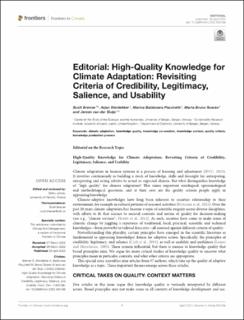| dc.contributor.author | Bremer, Scott | |
| dc.contributor.author | Wardekker, Arjan | |
| dc.contributor.author | Baldissera Pacchetti, Marina | |
| dc.contributor.author | Soares, Marta Bruno | |
| dc.contributor.author | Sluijs, Jeroen Pieter van der | |
| dc.date.accessioned | 2022-06-29T10:20:10Z | |
| dc.date.available | 2022-06-29T10:20:10Z | |
| dc.date.created | 2022-06-22T13:35:16Z | |
| dc.date.issued | 2022 | |
| dc.identifier.issn | 2624-9553 | |
| dc.identifier.uri | https://hdl.handle.net/11250/3001504 | |
| dc.description.abstract | Editorial on the Research Topic
High-Quality Knowledge for Climate Adaptation: Revisiting Criteria of Credibility, Legitimacy, Salience, and Usability
Climate adaptation in human systems is a process of learning and adjustment (IPCC, 2022). It involves continuously re-building a stock of knowledge, skills and foresight for anticipating, interpreting and acting relative to actual or expected climate. But what distinguishes knowledge of “high quality” for climate adaptation? This raises important ontological, epistemological and methodological questions, and at their core are the quality criteria people apply in appraising knowledge.
Climate-adaptive knowledges have long been inherent to societies relationship to their environment, for example in cultural patterns of seasonal activities (Kwiecien et al., 2021). Over the past 20 years climate adaptation has become a topic of scientific enquiry across diverse disciplines, with efforts to fit that science to societal contexts and norms of quality for decision-making (see e.g., “climate services”; Hewitt et al., 2012). As such, societies have come to make sense of climatic change by juggling a repertoire of traditional, local, practical, scientific and technical knowledges—from proverbs to tailored forecasts—all assessed against different criteria of quality.
Notwithstanding this plurality, certain principles have emerged in the scientific literature as fundamental to appraising knowledges' fitness for adaptive action. Specifically, the principles of credibility, legitimacy, and salience (Cash et al., 2003), as well as usability and usefulness (Lemos and Morehouse, 2005). These remain influential, but there is nuance to knowledge quality that broad principles miss. We argue for more critical studies of knowledge quality to uncover what principles mean in particular contexts, and what other criteria are appropriate.
This special issue assembles nine articles from 37 authors, which take up the quality of adaptive knowledge as a topic. Three important themes emerge across these articles. | en_US |
| dc.language.iso | eng | en_US |
| dc.publisher | Frontiers Media | en_US |
| dc.rights | Navngivelse 4.0 Internasjonal | * |
| dc.rights.uri | http://creativecommons.org/licenses/by/4.0/deed.no | * |
| dc.title | Editorial: High-Quality Knowledge for Climate Adaptation: Revisiting Criteria of Credibility, Legitimacy, Salience, and Usability | en_US |
| dc.type | Journal article | en_US |
| dc.type | Peer reviewed | en_US |
| dc.description.version | publishedVersion | en_US |
| dc.rights.holder | Copyright 2022 Bremer, Wardekker, Baldissera Pacchetti, Bruno Soares and van der Sluijs | en_US |
| dc.source.articlenumber | 905786 | en_US |
| cristin.ispublished | true | |
| cristin.fulltext | original | |
| cristin.qualitycode | 1 | |
| dc.identifier.doi | 10.3389/fclim.2022.905786 | |
| dc.identifier.cristin | 2034260 | |
| dc.source.journal | Frontiers in Climate | en_US |
| dc.relation.project | ERC-European Research Council: 804150 | en_US |
| dc.identifier.citation | Frontiers in Climate. 2022, 4, 905786. | en_US |
| dc.source.volume | 4 | en_US |

